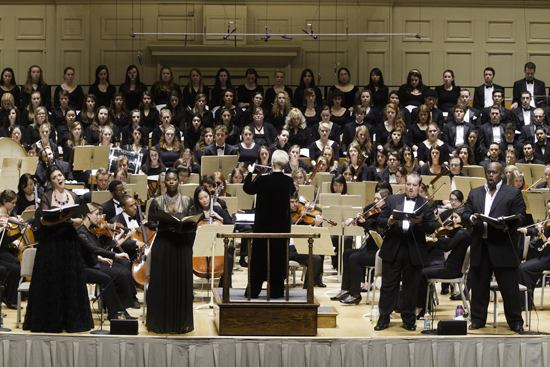BU Launches Virtual Concert Hall
Symphony Hall performances now available online

If you missed the BU Symphony Orchestra and Symphonic Chorus performing Giuseppe Verdi’s Requiem at Symphony Hall in December, you can catch it on CFA’s new Virtual Concert Hall. Photo by Michael J. Lutch
When Melanie Burbules (CFA’14) walked onto the stage of Symphony Hall last spring to perform in a BU production of Felix Mendelssohn’s Elijah, both of her parents were watching, despite the fact that her father was stationed in Baghdad and her mother was home in Chicago. Each viewed a live-stream of the performance on a computer. Although many miles and worlds away from each other, the Burbuleses were able to share a simultaneous moment of pride as parents.
“That’s just one story of how the virtual world can reach to the hearts of audiences,” says Benjamin Juarez, dean of the College of Fine Arts.
Now, thanks to an initiative instituted by Juarez, more people will be able to enjoy CFA events via virtual technology. In late 2011, the School of Music launched what it bills as a Virtual Concert Hall. The website features two 2011 Symphony Hall performances by the BU Symphony Orchestra and Symphonic Chorus, Mendelssohn’s Elijah in April and Verdi’s Requiem and Schoenberg’s A Survivor from Warsaw this past December, as well as A Centennial Celebration of Roman Totenberg in November 2010. More than 2,500 people have already watched the Elijah all the way through, more than double the number of people who attended the concert. And 6,000 people have downloaded the page.
“That greatly increases the access, which is especially good for all the student performers who can share the concert with family and friends who couldn’t make it because of the lives we all lead,” Juarez says.
With the Virtual Concert Hall, Boston University joins a small but growing number of universities putting their concerts online, including Yale University, which webcasts selected live performances. But no other school is yet recording in high definition or using as many cameras as CFA, says Casey Soward, School of Music assistant director of production and performance.
Juarez says the Virtual Concert Hall will increase the audience for CFA performances by making them more convenient and because they are free. The site may even be an improvement over sitting in the concert hall, he acknowledges. The energy of the live performance may be missing, Juarez says, but watching the video will afford viewers details that concert-goers don’t see, such as detailed shots of the conductor or a violinist bowing.
“This is a fantastic way to share what we do in the school and bring it together in one beautiful package,” he says. “It’s an investment that’s impossible not to make.”
Juarez also believes the Virtual Concert Hall will help expand the ever-shrinking audience for classical music. Reports by the National Endowment for the Arts have found that fewer and fewer Americans have been making their way to a concert hall. According to a 2008 NEA study, only about 9 percent of adults in the United States reported attending a classical music concert in the past year, down from 13 percent in 1982.
The School of Music began experimenting with putting concerts online in 2010 with the Symphony Hall concert honoring the late CFA Professor Emeritus Totenberg. That concert was shot with three cameras and streamed live. The December concert was not streamed, but was the first to be recorded in high definition, Soward says, and four cameras were used.
Soward says that even more cameras were used when the BU Symphony Orchestra and Symphonic Chorus performed Rachmaninoff’s The Bells and Shostakovich’s Symphony No. 11, The Year 1905, at Symphony Hall on April 2. The concert was streamed live on the Virutal Concert Hall site and then archived there.
The plan, Juarez says, is to grow the site incrementally, with several more concerts to be added next year. Over time, he says, the goal is to put more and more of the school’s 400 annual concerts online, as well as art exhibitions featured in CFA’s four galleries.
“The possibilities are endless,” Juarez says, “but first we want to start with baby steps on solid ground and then grow from there.”
Comments & Discussion
Boston University moderates comments to facilitate an informed, substantive, civil conversation. Abusive, profane, self-promotional, misleading, incoherent or off-topic comments will be rejected. Moderators are staffed during regular business hours (EST) and can only accept comments written in English. Statistics or facts must include a citation or a link to the citation.